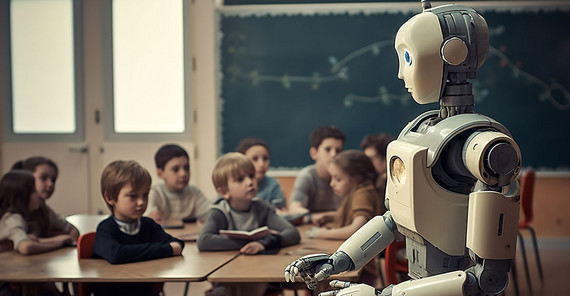One thing is clear: Digitalization of the classroom is not a cure-all, and AI will not reinvent teaching. “They cannot and should by no means replace teachers but rather support them,” explains Prof. Dr. Rebecca Lazarides. “It has also been clear for a long time that learners hardly benefit from digital devices if they sit in front of them for hours alone. Such resources should accompany ordinary lessons in a meaningful way.” The educational scientist is researching intelligent tutoring systems, or ITS for short. These could help teachers to do even more justice to the heterogeneity of their classes. This already works for individual learning: There are already programs that recognize when a student needs help with tasks that are completed on a tablet - and then give tips. But researchers are convinced that ITS can do even more. Together with colleagues from the Berlin Cluster of Excellence “Science of Intelligence”, Prof. Lazarides launched several projects in 2019 to better utilize the potential of digital assistance. These projects investigated how ITSs can be developed in such a way that they also foster the motivation and emotional development of learners. “If someone is bored in class, ITS that are primarily designed to activate the cognitive process are of little help,” she says. “We were interested in whether and how this could be counteracted.” They investigated this problem in several series of experiments with school classes – successfully. “We can interest and motivate many of them if we don’t just focus on increasing performance when designing the ITS,” Prof. Lazarides says. “It helps high achievers not to get bored.” However, the project has also shown that not everyone benefits equally from such systems. But Prof. Lazarides is confident that further research can help to ensure that everyone benefits from the use of an ITS. In the meantime, follow-up projects have been initiated, for example on the question of whether it is better for a learning robot to directly engage with learners. Another project is investigating how ITS can best support language learning. Prof. Lazarides and her team – backed by the convincing results – are also working on bringing the tutoring systems to schools. “We approach school administrators and teachers directly and show them in workshops how AI in the form of an ITS can be used effectively in the classroom,” she says. “Then they have to decide for themselves what to use.” And what about ChatGPT & Co.? Lazarides recommends that teachers don’t outright refuse them. “The children use them at home anyway. If you use them in the classroom, you can help children develop the skills they need to work with them in a smart way.”
The Researcher
Prof. Dr. Rebecca Lazarides has been Professor for Teaching in Schools/ Empirical Research into Teaching at the University of Potsdam since 2021.
Email: rebecca.lazaridesuuni-potsdampde
Further reading
Publications of the working group on intelligent tutoring systems: Prof. Rebecca Lazarides, Dr. Johann Chevalère, Artificial intelligence and education: Addressing the variability in learners’ emotion and motivation with adaptive teaching assistants, Bildung und Erziehung, vol. 74, no. 3, 2021, doi.org/10.13109/buer.2021.74.3.264
Johann Chevalère et al., Do instructional strategies considering activity emotions reduce students’ boredom in a computerized open-ended learning environment?, Computers & Education, Volume 196, April 2023, https://doi.org/10.1016/j.compedu.2023.104741
How the project started: https://www.uni-potsdam.de/de/nachrichten/detail/2020-06-09-lernen-mit-gutem-gefuehl-die-bildungswissenschaftlerin-rebecca-lazarides-will-roboter-zu
This text was published in the university magazine Portal Wissen - Eins 2024 „Bildung:digital“ (PDF).


